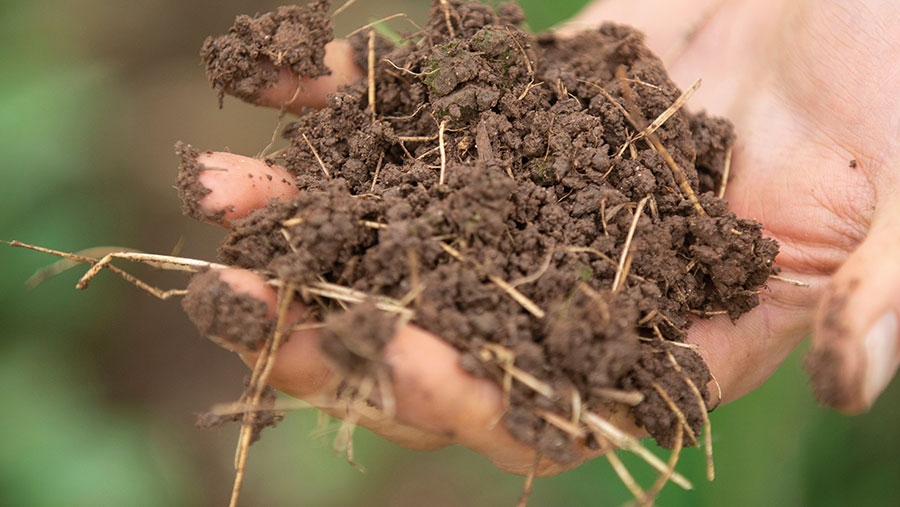NFU food report sets out foundations for improving farm soil
 © Tim Scrivener
© Tim Scrivener A major new report setting out the importance of soil in food production has outlined eight actions farmers can take to improve this vital asset and ensure the UK’s food security, while meeting climate targets and looking after the environment.
The NFU’s Foundation of Food report highlights why good soil health is crucial to the nation’s farming systems and is essential to British food production.
It explains the benefits healthy soil delivers: reducing flood risk; supporting wildlife habitats and biodiversity; and the sequestration and storage of carbon.
See also: Widespread uptake of SFI crucial to new NFU soil health strategy
Alongside seven key soil asks for future government policy, the report highlights eight farmer actions that can improve soil health and long-term productivity, while supporting the industry’s 2040 net-zero target.
Aidan Gill, NFU environment policy adviser, said it was important to recognise the diversity of UK soils.
“What might work for someone in Lincolnshire might not work for someone in Herefordshire,” he said.
“What might work in one part of the field might not work in another part.”
“We need a decentralised system that understands this variety, and provides local solutions to local problems.”
While many farmers will be aware of these practices and already have them in place, the advice is a useful reference point.
- Reviewing cultivation methods
Although not suitable for all soil types, direct drilling and minimum tillage are both increasing in popularity, driven by improvements in equipment.
Reducing cultivations lowers the cost of crop establishment through less machinery use, fuel and labour cost.
- Aiming for better nutrient balance
Have a plan in place for nitrogen and phosphorus use and match applications to crop requirements.
Routinely test soil and use the data to maintain or improve crop and livestock productivity, as well as environmental benefits.
- Organic matter maintenance
Preserving organic matter through increased organic inputs and maintaining soil cover throughout the year.
Cover crops protect and enrich soil between periods of regular crop production.
Farmyard manures, alternative organic sources such as digestate, compost and biosolids can increase soil organic matter in arable soils
- Optimising crop rotations
Growing a diversity of crops in succession helps build up soil health and soil fertility, and can help combat pests, weeds and diseases.
Grass leys in arable rotations can improve soil organic matter through grass root growth.
- Agroforestry
Introducing more trees into a productive crop or livestock system could help restore degraded soil.
The right tree for the right place is fundamental to success and trees can also provide additional income, as well as wildlife and conservation benefits.
- Reducing compaction
Using controlled traffic farming to limit all farm machinery to fixed tramlines across fields.
Machinery will drive on 25-40% of the field in a season, compared with 85% in a conventionally ploughed field. Improved soil structure can lead to 15-30% increased yields.
- Maintaining good drainage
Good drainage is essential for healthy soil, productivity and resilience against climate change.
Avoiding waterlogging and compaction extends grazing seasons on grassland and improves the workability of arable land, promoting good crop establishment.
- Peatland management
Cover crops can protect peat and high-value vegetable crops.
There is also increasing adoption of practices such as subterranean irrigation, precision farming (which uses machinery guided by satellite technology), minimum till technology and no-till technology.
